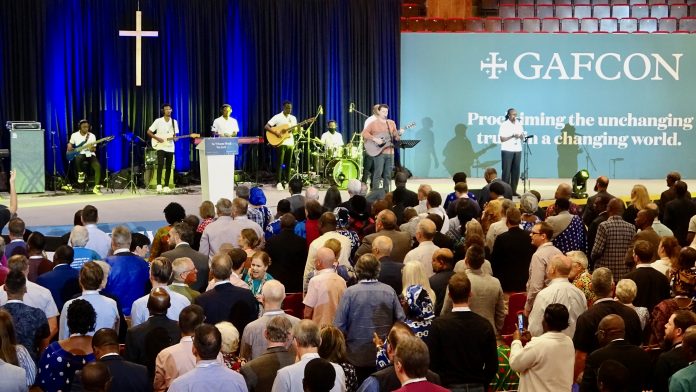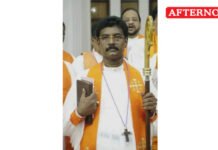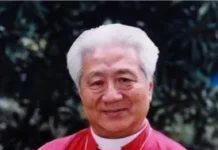Anglican ministries operating outside of the formal structures of the worldwide Anglican Communion are being provided a platform this week at a major gathering of traditionalist Anglicans.
“We seek to shape our lives around the scriptures, rather than the scriptures around our lives,” described the Rev. Calvin Robinson, a deacon in the Free Church in England, in offering an update during The Global Anglican Future Conference (GAFCON) Tuesday evening plenary. Robinson was among several delegates from Anglican churches not officially recognized by the Archbishop of Canterbury that minister in the British Isles and continental Europe.
GAFCON was inaugurated in 2008 as a fellowship of many disparate groups seeking reform and renewal within the family of churches descended from the missionary activities of the Church of England.
Sometimes perceived as a fellowship of nine Anglican Provinces (national churches in Anglican parlance), GAFCON is, in fact, a wider Anglican renewal movement gathered this week in Kigali, Rwanda.
Delegates from more than 53 nations are participating at the conference, many from provinces not formally aligned with GAFCON, or ministering within ecclesial groups not recognized by the Archbishop of Canterbury. In some cases, there are regional diocesan or local parish relationships with GAFCON absent a provincial relationship.
“If there is any reason for GAFCON, this is it: bring Christ to the world,” declared GAFCON Secretary Archbishop Ben Kwashi of Jos, Nigeria. Kwashi interviewed London clergyman Rico Tice of All Souls Langham Place at a conference session on evangelism inviting the laity to share the Gospel of Mark in one-to-one reading of the scriptures alongside neighbors and colleagues.
Traditionalist Anglicans gathered here are hearing testimony of ministries underway in places not customarily associated with vibrant, evangelistic Anglican witness.
“The Archbishop of Canterbury is not head of the church,” noted Bishop Jay Behan, adding that bishops, synods, and GAFCON itself are not the head of the Church, either. “Only Jesus is the head of the church.”
In Kigali, GAFCON has sought to highlight and platform those churches like the one Behan oversees in New Zealand. These relatively new GAFCON-initiated structures, including the Anglican Mission in Europe and GAFCON Ireland, offer episcopal oversight and Anglican fellowship to local churches that believe they are either limited or prevented from offering a faithful witness in historic, Canterbury-aligned structures. In some cases, these are analogous to earlier work GAFCON did in calling for the formation of the Anglican Church in North America (ACNA) in the late 2000s and the Anglican Church in Brazil in the 2010s. The ACNA ministers as a parallel province overlapping with the U.S.-based Episcopal Church, the Anglican Church in Canada and the Anglican Church of Mexico.
Also included in Kigali are historic, nonconforming churches that predate GAFCON. Among them the Free Church in England, which has similar history and practice to the Reformed Episcopal Church in the United States.
In many cases, these ministries operate in geographic areas where official, Canterbury-aligned structures have either neglected or outright limited Evangelical or Traditionalist Anglicans from ministering within their church bodies.
These places include Wales, where Anglican Church in North America (ACNA) Archbishop and GAFCON Chair Foley Beach recently consecrated a GAFCON-recognized bishop for Anglican churches outside of the theologically revisionist and numerically declining Church in Wales. Bishop Lee McMunn, who overseas churches in Scotland, Bishop Andy Lines of the Anglican Mission in England, and the Rev. Tim Anderson of GAFCON Ireland, each shared about their ministries.
“We’ve seen the Church of England led by the Archbishop [of Canterbury] walk away from scripture,” charged Beach in his GAFCON Chairman’s address on the opening night April 17.
Ireland, a place where much of western Christian history is rooted, now has the lowest number of believers per capita in the English-speaking world. This challenge requires dual paths, Anderson explained: support for those ministering within the Canterbury-recognized Church of Ireland, and alternative structures where Anglicans believe they cannot faithfully operate within the recognized church.
“The authority of scripture is a thing to hold on to tightly,” Rwandan Archbishop Laurent Mbanda stated in opening the conference. “GAFCON wants and desires keeping the Bible at the center.”



